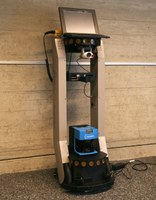Idiap has a new robot platform -- Pippo!
Pippo will enable us to work on place categorization for autonomous agents: we can easily recognize a room as a kitchen even if it is the first time we see it --how can we enable robots to do the same? what are the relevant informations that make us say that a room belongs to a specific categories? Thanks to Pippo, we will be able to study these issues and test our findings on a mobile platform --get ready to meet Pippo moving around the Idiap's corridors very soon!
The ability of building robust semantic space representations of environments is crucial for the development of truly autonomous robots. This task, inherently connected with cognition, is traditionally achieved by training the robot with a supervised learning phase. This proposal argues that the design of robust and autonomous systems would greatly benefit from adopting a semisupervised online learning approach. Indeed, the support of open-ended, lifelong learning is fundamental in order to cope with the dazzling variability of the real world, and online learning provides precisely this kind of ability. The proposed research will focus on the robot place recognition problem, and design online categorization algorithms that occasionally ask for human intervention based on a confidence measure. By modulating the number of queries on the experienced data sequence, the system adaptively trades off performance with degree of supervision. Through a rigorous analysis, simultaneous performance and query rate guarantees will be proven in extremely robust (game-theoretic) data generation scenarios. This theoretical analysis will be supported and complemented by extensive evaluation on data acquired on real robotic platforms.
participants: Barbara Caputo, Marco Fornoni, Jesus Martinez Gomez, Sriram Prasath (Idiap); Nicolo' Cesa-Bianchi, Francesco Orabona (University of Milan `La Statale')
